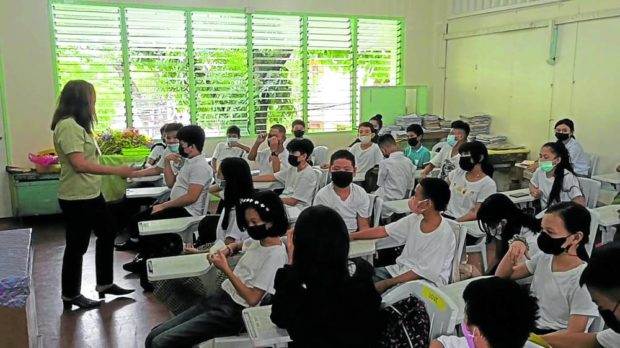67 percent of teachers say heat in their classrooms ‘intolerable’

File photo of students in Apas National High School in Cebu City. INQUIRER file photo / DALE ISRAEL
MANILA, Philippines — Around 67 percent of teachers said the heat in their classroom is intolerable, the Alliance of Concerned Teachers (ACT) revealed on Tuesday.
On the other hand, about 32 percent said that the temperature inside their classrooms is bearable, while 0.5 percent of respondents deem their classroom conditions as pleasant.
This was the result of ACT’s online survey among 11,706 public school teachers nationwide from March 24 to 27, 2023.
The teachers’ confederation made the survey shortly after the incident where 120 students in Laguna were hospitalized after observing classroom drills under scorching heat last March 23.
“Still, the classroom atmosphere remains inconducive to learning,” ACT chairperson Vladimer Quetua said in a statement.
Article continues after this advertisement“One can only imagine the misery of our learners and teachers inside cramped classrooms with no effective ventilation and amid the gruelling summer heat,” Quetua added.
Article continues after this advertisementThe survey also revealed that classrooms heavily rely on electric fans for ventilation as 97 percent of respondents said that they use electric fans, while only one percent have air conditioners and two percent only depend on natural ventilation.
Quetua said the hot temperature in classrooms may cause health issues as “many students and teachers complain of headache, dizziness, and nosebleeds, while our schools have no appropriate health facilities and personnel.”
According to ACT, survey respondents suggested a number of ways on how to address the problem, such as installing air conditioners in classrooms, changing the class schedules to avoid the hottest hours of the day, and implementing blended learning by alternately holding face-to-face classes in the mornings and distance learning modalities at home.
Quetua anticipates that DepEd will say that installing air conditioners in every classroom is impossible, while also admitting that it will be risky for children when classes end up late at night and that the quality of distance learning is not at par with face-to-face classes.
“The proposed moves have their pros and cons,” Quetua admitted. “We are now asking the Department of Education, what solutions do you offer?”
—MJ Soriano, trainee